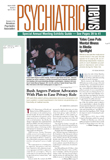Establishment of external review panels seems like a logical approach to the problem of resolving disputes between health plans and the consumers they insure.
In fact, by the end of 2001, 41 states and the District of Columbia had enacted external review laws, with 27 of them becoming effective in the past three years.
Last session, Congress considered patients’ rights legislation that would establish a federal right to external review for all private health plan enrollees. This federal right would have extended external-review protection to people who are not subject to state external-review programs, including enrollees of self-insured employer health plans (47 percent of all employees with group health coverage), which are exempt from state regulation, and residents of states with no external-review laws.
Key questions at this point are, Have these laws and other provisions for external review lived up to their promise, and does review of mental health benefits pose any special problems?
Few Using External Review
The Kaiser Family Foundation commissioned researchers at Georgetown University’s Institute for Health Care Research and Policy to assess the impact of state external review programs.
In a study released in March, they reported that consumers were granted relief through external review about half of the time they chose to invoke it. Rates ranged from a low of 21 percent in Arizona and Minnesota to a high of 72 percent in Connecticut.
Caseloads, however, were very small. In New York, 902 consumers filed for review in the reporting year ending June 2000. That figure was more than double that for any other state. Still, it represented far less than 1 percent of covered lives in the state.
According to the researchers, many of the external review programs have features that inhibit access. All but one of the states studied require consumers to first exhaust their health plan’s internal appeals and grievance procedures before seeking external review.
There is evidence, however, that consumers do not complete the internal-review process, which often requires three levels of appeal. For example, in Pennsylvania from January 1999 through September 2000, consumers appealed almost 8,200 health plan denials. Health plans upheld 4,469 denials at the first level of appeal, but only 1,062 consumers filed level 2 appeals. At level 2, health plans upheld 618 denials, but only 124 consumers then filed for external review.
Claims Review Problems
Winifred S. Hayes, president and CEO of HAYES Plus Inc., told an audience in February at the National Policy Conference at the American Association of Health Plans (AAHP) in Washington, D.C., “Mental health is a particularly challenging area because of the perception that there is less evidence-based research for mental health treatment than for other areas of medicine.”
HAYES Inc. is one of a growing number of Independent Review Organizations (IROs) that conduct reviews at the request of an insurance company or a state agency responsible for administering the law mandating external reviews.
In an interview with Psychiatric News, Hayes said that mental health also differs from other areas of medicine because of the impact of safety issues on the determination of medical necessity for treatment approach and setting. “Consideration of the likelihood of suicide or homicide becomes very important when making determinations about inpatient [psychiatric] treatment,” she explained.
Benefit definitions can also complicate the review process. In one case, two doctors on a review panel argued successfully for an inpatient stay that exceeded the number of allowable days for mental health treatment for a woman with postpartum depression by saying that pregnancy is a medical condition and, therefore, not subject to the restrictions for mental health coverage.
Hayes noted a “troubling trend” for health plans to specify the number of treatment days covered rather than to use medical necessity as a determining factor for treatment. Companies are better able to control financial and legal risk by using a time-specific method of determining benefits, but when that happens, said Hayes, “we lose flexibility, and patient care can suffer.”
Susan Prest, president of Prest and Associates, an IRO that focuses exclusively on review of mental health claims and other mental health care services, speculated that the appeals process might be underutilized for mental health and substance abuse cases because of stigma. “Each level of appeal means that an additional set of reviewers has access to personal details about those illnesses,” she said.
Bettina Kilburn, M.D., Prest’s medical director, said that although treatment guidelines for various mental illnesses might not be as “black and white” as those for some other medical conditions, there is ample research to make determinations, particularly in the case of the use of medications, electroconvulsive therapy, and forms of psychotherapy.
She noted the importance of including specialists on review panels, because research about mental illness is proceeding so quickly that only a specialist in a particular disease would be familiar with the latest research. According to the Kaiser study, only Vermont and Minnesota have separate state review panels for mental illness and substance abuse (Psychiatric News, March 15).
Kilburn suggested that the small number of cases that reach the level of state external-review panels might in part result from the fact that insurance companies want to settle before the case reaches that point and becomes part of a public record.
The Web site for Hayes Inc. is www.hayesinc.com. The Web site for Prest and Associates is www.prestmds.com. ▪
